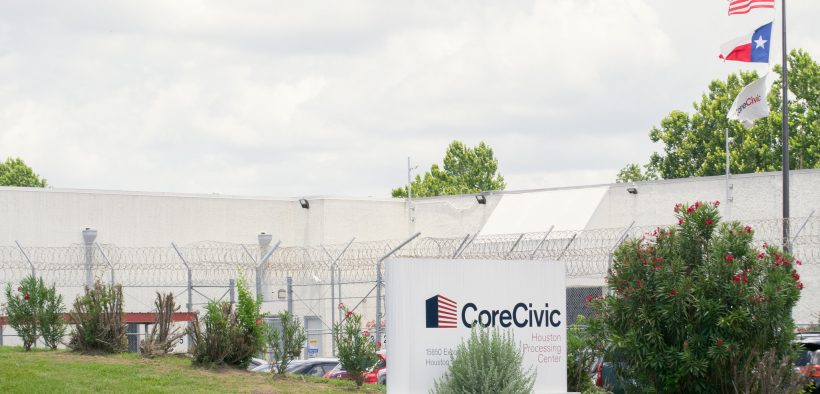Private Prison Homicide Rates in Tennessee Vastly Higher Than State-Run Facilities

“CoreCivic’s profit model is built around understaffing and constant lockdowns of poorly run, exceedingly dangerous prisons.”
A July report from the Human Rights Defense Center (HRDC) and No Exceptions Prison Collective found that CoreCivic, a private for-profit prison operator, reported twice as many homicides at its four Tennessee prisons than the Tennessee Department of Corrections (TDOC) recorded at its ten state-run facilities in the same five year time period.
The findings come despite the fact that CoreCivic is operating fewer prisons than TDOC, housing a much smaller total prison population than TDOC and operates mostly medium-security facilities.
CoreCivic operates four Tennessee state prisoners: the Whiteville Correctional Facility, South Central Correctional Facility, Hardeman County Correctional Facility and Trousdale-Turner Correctional Center.
According to Prison Legal News, a publication by HRDC, the Trousdale-Turner Correctional Center, which opened in 2016, has been criticized in a state audit, during legislative hearings and in news reports. TDOC has also fined CoreCivic over $2 million for contract violations at TTCC.
During the time period studied by HRDC and No Exceptions, March 2014 through June 2019, CoreCivic reported ten prisoner homicides, whereas the TDOC reported five prisoners murdered. CoreCivics’ higher number of murders is despite housing less than half the prison population that TDOC houses.
“From 2014 through June 2018, CoreCivic facilities housed from 24.65% to 34.59% of the state’s prison population, with an average of 30.09% (population data for FY 2019 has not yet been released by the TDOC and was not used). Thus, while TDOC facilities housed 70% of the state’s prison population on average, twice as many homicides occurred in CoreCivic facilities. The average homicide rate in TDOC prisons was .67 per 10,000 prisoners while the average rate in CoreCivic facilities was 3.13 per 10,000 prisoners – or 4.64 times higher,” explained Prison Legal News.
HRDC and No Exceptions first announced their findings at a July press conference outside CoreCivic’s Nashville, Tennessee headquarters. Both organizations are prisoner rights’ advocacy groups that advocate against the private prison industry.
CoreCivic Responds
In response to the press conference, CoreCivic called the findings “politically biased” and argued that HRDC’s and No Exceptions data analysis was not a true “apples-to-apples” comparison.
In a four-point statement, CoreCivic argued that TDOC houses more females than CoreCivic which only houses male prisoners, that a rate-per-10,000 is “statistically questionable” because CoreCivic doesn’t even house 10,000 inmates, that a more accurate comparison would include “charge data” (data on offense type), and claimed that TDOC holds a substantial portion of minimum-security prisoners.
Prison Legal News, which is a publication of HRDC, responded that CoreCivic’s statement that it houses “a higher concentration of inmates convicted of murder or other violent crimes” was completely false. Instead, it claimed that TDOC houses more prisoners convicted of homicide and violent crimes than CoreCivic.
“In terms of the ‘concentration’ of prisoners with homicide convictions, using the data in the TDOC’s FY 2018 report, an average 15.25% of the population at the four CoreCivic prisons included prisoners with homicide convictions. Yet the average percentage of prisoners with homicide convictions in state-run prisons was 20.6%. Again, CoreCivic’s statement was completely false,” wrote Prison Legal News.
“CoreCivic’s profit model is built around understaffing and constant lockdowns of poorly run, exceedingly dangerous prisons. For years, prisoners and their loved ones have begged for government officials to intervene and put an end to CoreCivic’s cultivated environment of abuse, neglect and death. The only acceptable solution to the human rights disaster that CoreCivic has been allowed to create is to shut this corporation down. No one should profit from torture,” Jeannie Alexander, an attorney, former TDOC chaplain and director of the No Exceptions Prison Collective, told Prison Legal News.
Private Prison Industry
For-profit prisons house roughly ten percent of the total U.S. prison population, yet private prisons house approximately two-thirds of U.S. Immigration and Customs Enforcement (I.C.E.) detainees.
While private prisons have come under increasing scrutiny as the government has turned to for-profit prisons to detain people arrested by I.C.E., negative publicity has surrounded the private prison industry for years.
In fact, CoreCivic used to be called the Corrections Corporation of America but changed its name in October of 2016 as part of a rebranding effort.
The private prison industry looked in trouble when the Obama administration and the Bureau of Prisons ordered the phasing out of the use of private for-profit prisons in 2016. According to Reuters, stocks for CoreCivic and GEO Group, another major for-profit prison operator, plummeted 40% after the announcement. However, stocks for both companies rebounded when, shortly after Donald Trump was elected president, then U.S. Attorney General Jeff sessions ordered the reversal of the private-prison phase-out.
Despite the Trump policy reversal, advocacy against the private prison industry has found moderate success. JPMorgan Chase & Co announced last March that it would “no longer bank the private prison industry.”
Chase’s announcement came after a January announcement from Wells Fargo claimed it was reducing its banking with private prisons.
“Our credit exposure to private prison companies has significantly decreased and is expected to continue to decline, and we are not actively marketing to that sector,” Wells Fargo said in its “Business Standards Report” for 2018.
Most recently, Bernie Sanders, a leading 2020 presidential candidate, announced a plan to overhaul the criminal justice system which would include a ban on private prisons. Sanders’ announcement came on Sunday and included plans to abolish the death penalty, end cash bail, legalize marijuana and halve the incarcerated population by ending excessive sentencing.
“Can you believe that, in the year 2019, 400,000 people are in jail awaiting a trial because they are poor?” Sanders told the Associated Press. “That is a moral outrage, it is a legal outrage.”














Privitization! How wonderful it has been (for the billionaires).